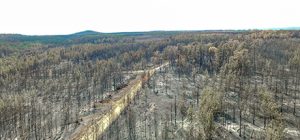The NSW Government has pumped an extra $140 million into the forestry, horticulture and agriculture industries impacted by the bushfires as part of a new recovery fund. Bushfire recovery efforts are continuing throughout the Eden-Monaro and South Coast regions despite ongoing setbacks due to COVID-19 and its social distancing and isolation requirements. Source: Timberbiz
The NSW Minister for Disaster Recovery, and Deputy Premier and state member for Monaro, John Barilaro said the package would help inject life into struggling rural industries that were suffering on multiple fronts.
“Communities in the Monaro are doing it tough, from drought to bushfires and now dealing with the impact of COVID-19,” Mr Barilaro said.
“Bushfire-impacted towns cannot afford to suffer further job losses and economic downturn, which is why we are delivering this funding to keep our key regional industries in business.
“Industries with the greatest impact will be given the greatest share of this funding. The program will focus on recovery in the short-term and will support valuable investments to help these sectors plan for recovery in the longer term.”
NSW Premier Gladys Berejiklian said it was integral that businesses remain viable because farmers continue to feed the state and the nation throughout the COVID-19 pandemic.
“Regional NSW relies on these key driver industries to help generate jobs and economic activity, and this funding will provide the direct help many businesses need to recover from devastating losses, which in turn will help their wider industry remain viable,” she said.
The new package is in addition to the NSW Government’s $1 billion bushfire fund to replace vital state infrastructure, as well as $75,000 grants for bushfire-affected primary producers, and $50,000 grants for bushfire affected small businesses.
Debris and bushfire clean-up will also take a step forward in areas around Nerriga, in the Southern Tablelands, during the next month as work ramps up in the region.
Mr Barilaro said small businesses and residents in areas such as Corang, Oallen, Tomboye and Wog Wog would be contacted by teams from Laing O’Rourke – the company coordinating the bushfire clean-up – about their specific situation, including what to do if workers find personal belongings and what structures they want to be retained or removed.
“We have seen in other areas across the state that it takes around two days to clear debris on one property,” said Mr Barilaro. “However, it can take longer especially when there are hazardous materials such as asbestos.
“The faster we can clean up; the sooner communities can start rebuilding and get on with their lives. I hope that clearing away debris, so it is not a constant reminder, will help our region commence the healing process.”
Mr Barilaro said that the funding scheme ensures that insured owners will have more funds to devote to rebuilding and uninsured owners will not be left out of pocket.
Residents with questions about the bushfire clean-up in Eden-Monaro can call Laing O’Rourke’s information hub on 1800 007 539.






